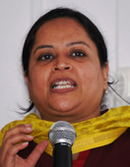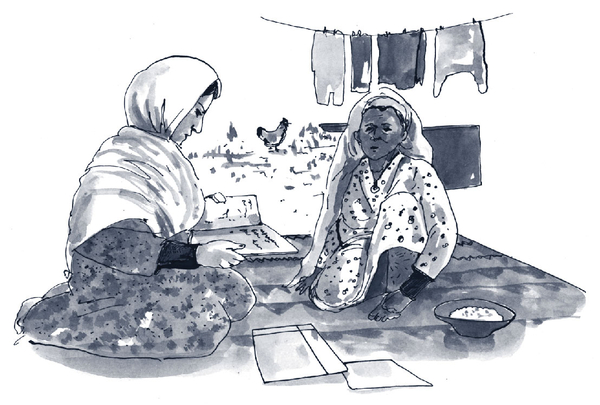Soft skills in non-formal education: building capacities of the youth
 Priti Sharma
Priti Sharma
PRIA International Academy
India
Abstract – This article describes the importance of soft skills with special focus on the youth and the non-formal education system. It takes readers through some of the efforts made by the Society for Participatory Research in Asia (PRIA) in bridging the gaps that exist today with regard to soft skills. Taking a clue from Sustainable Development Goal 4 and the broader discourse at global level, it tries to explain the scope and usefulness of soft skills.
In recent years, emphasis on the importance of soft skills has grown all over the world. It is no longer enough to know the technical aspects of a job, but how this knowledge will transform into output. Our behaviour, attitude, communication skills, etc., play an important role in the work place, and when looking for a job.
These have often been called 21st century skills, or soft skills. We are talking about knowledge which includes a broad set of skills, work habits and character traits that are believed – by educators, school reformers, college professors, employers, and others – to be critically important to success in today’s world, particularly in contemporary careers and workplaces.
Today, no one works in isolation. We are all connected to each other in a given job scenario. Multidisciplinary teams are needed to complete complex problems. To even address these complex problems or challenges we need soft skills. In this context, excellent knowledge of a subject without a good relationship with the team and no skills in team leadership will end badly, and everyone will be unhappy.
Soft skills include work ethics, attitude, communication skills, emotional intelligence and a whole host of other personal attributes. Sooner or later the discussion on soft skills usually turns to the other variety. Hard skills refer to trade skills and subject matter expertise, e.g. accounting, typing, operating machinery, etc. They are quantifiable and their application is universal. Hard skills are specific teachable abilities that are needed to perform a job.

Why emphasis on the soft skills
The Education for All Global Monitoring Report 2012 of UNESCO suggests putting education to work while talking about the youth and skills. Three skills that everyone needs to learn are presented. They are:
- foundational skills that include literacy and numeracy and are a prerequisite for further education;
- technical skills that are needed to do a job, e.g. operating a machine or accounting; and lastly
- transferable skills that include things like creativity and communication.
Many authors/trainers of soft skills speak about the 4Cs of learning. They are: communication, critical thinking, creativityand collaboration.
Start with yourself. Look around you. The heterogeneity of groups working together has increased over the years. People, especially the youth, have been moving to other continents in search of better work opportunities. At workplaces, teams with diverse backgrounds work with newer communities and groups. These heterogeneous groups need the technical know-how to do a job as well as be sensitive and empathetic to the teams and groups that they work with.
Focus on the youth
Sustainable Development Goal 4 on Quality Education talks about increasing the number of youth and adults who have relevant skills, including technical and vocational skills, for employment, decent jobs and entrepreneurship. In many places, governments have also been promoting the use of skills through various programmes and policies.
The role of the youth in society has been evolving. Four roles stand out:
- Civil Role – expectations about the ability to understand and influence civic decision making;
- Environmental Role – understanding and being sensitive to one’s own environmental issues;
- Economic Role – the youth have to earn their livelihood in today’s competitive scenario; and lastly
- Social Role – understanding and appreciating the social differences of different communities.
Let’s take India as an example. A recent economic survey concluded that by 2020, India’s population would have an average age of 29. This makes it the only country with a surplus of young people in its population. These young people need to be suitably educated and appropriately skilled so they can participate in society and contribute to economic activities. Existing education systems may, at best, teach technical know-how, but not the soft skills that they still need to learn.
PRIA experience of working with the youth
PRIA has been acting as a facilitator through many of its programmes. These programmes focus on learning for the youth, with their purpose being to make these young people become agents for change. PRIA also helps build up the capacities of the youth so they can take up various issues for their own communities. Recently, PRIA has focused on two broad thematic areas: first, working with the youth on the issue of prevention of violence against women and girls; second, focusing on a combination of skills for work and life by building capacities to use technology to map their own settlements for basic services such as drinking water, sanitation and electricity, etc. The capacity building approaches include interventions aimed at bringing about attitudinal and personal changes. These programmes have been based on principles of participatory action research to change the mind sets of the communities and challenge stereotypes. The interventions focus on combining skills for work and life.
The work on violence against women and girls has helped build the capacities of the youth to speak about the issue with their families, community, elected representatives and other stakeholders such as the police and health sector personnel. These youth, both men and women, belong to conservative and orthodox societal systems. To bring them together in teams working for common goals requires a lot of effort. The capacity building incorporates a holistic approach to help them face similar challenges on their own later in life. The programme on mapping the service delivery of basic services also uses a similar approach to engage with the youth to build capacities. Building capacities on communication, the importance of working in teams, collaboration and leadership, etc., also plays an important part.
Soft skills in non-formal education
Let’s take a look at the importance of soft skills in non-formal education. We are talking about “an organised educational activity outside the established formal system that is intended to serve an identifiable learning clientele with identifiable learning objectives”.1
Non-formal education addresses the gaps in employability skills in numerous ways. Because soft skills are seen as increasingly important, employers also tend to assess these skills through various tests.
Unfortunately the current formal education system doesn’t support the learning of soft skills. Formal education systems usually focus on foundational skills like reading, writing and technical skills. That leaves a wide gap. Non-formal education is well placed and prepared to react. This will ultimately facilitate better working environments, and lead to improved productivity.
Building for the region
PRIA and the DVV South and South East Asia regional office recently organised a workshop on promoting skills for the youth. The deliberations focused on things like: What kind of skills are to be emphasised in this region when it comes to working with the youth? Many countries participating in the workshop talked about building soft skills.
In the end, it was decided to work towards developing soft skills, especially for those working in the non-formal education sector. There are expectations that non-formal education could address the gaps in relation to soft skills. To develop this one step further, PRIA facilitated a training programme for the partners of DVV working in the non-formal education sector in Lao PDR. To mainstream the topic better, a manual was developed focusing on enhancing the understanding of practitioners in non-formal education on soft skills. The manual includes steps and activities for facilitating training on soft skills, and can be used as reference material to facilitate trainings on building understanding on soft skills. To reach a wider audience, PRIA and the DVV South and South East Asia regional office also conducted a training of trainers (ToT) in Cambodia which also included participants from Vietnam and Lao PDR. Some of these participants were from the Southeast Asian Ministers of Education Organisation (SEAMEO). This training of trainers was facilitated with an understanding to build on the issue of soft skills for those working in the non-formal education system and thus prepare trainers who would take this issue forward and reach to a larger group of persons.
Conclusion
Looking at the broader picture, the importance and awareness on the issue of soft skills have grown. The increase in mentions and focus on such skills in various reports and scholarly articles only confirms this fact. Looking at Asia, the emphasis on such skills has gained momentum. At the First Regional Central Asian Adult Education Forum Key Skills for Youth in 21st Century2, organised by the DVV Central Asia Regional Office, participants emphasised the need to work on the issue of soft skills. Education systems should be in a position to prepare adults, especially youth, to deal with complex problems/challenges. Here the role of the state and other stakeholders is very important in engaging with the youth. It is imperative that the apathy of the youth towards various systems is addressed on appropriate platforms. It is also important to support youth leadership in defining systems. Young people need to be involved in the decision making. This can be done by addressing the existing gaps and building capacities wherever needed, soft skills being one of the most important.
Given this scenario, it is important to understand the existing mechanisms and work with them to promote building capacities on the issue of soft skills. This is especially true for the non-formal education sector due to its flexibility in promoting lifelong learning.
References
http://unesdoc.unesco.org/images/0021/002175/217509E.pdf
http://www.un.org/esa/socdev/unyin/newsletters/2011/YouthFlashJune2011
http://edglossary.org/21st-century-skills/
About the author
Priti Sharma has over 19 years of work experience in the development sector and has worked on issues related to local governance, civil society engagement, sexual harassment at the workplace and human resource management. She has worked as a researcher, trainer and coordinator. Currently, she is involved with PRIA International Academy (PIA) as Sr. Programme Manager.
Contact
priti.sharma@pria.org


